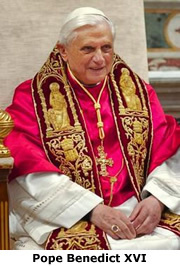
For an arcane academic lecture, it certainly made a splash:
Only a few hours after a retired faculty member returned to the University of Regensburg in Germany to speak in one of its venerable lecture halls onFaith, Reason and the University:Memories and Reflections,seven churches in the West Bank and Gaza had been set on fire; a 65-year-old Italian nun had been murdered, shot four times in the back as she entered a Mogadishu hospital; Morocco had recalled its ambassador to the Vatican; and the paper of record in Tehran had expressed editorial outrage aboutcode words for the start of a new Crusade. **
It was his post-retirement position that made emeritus professor Joseph Ratzingers remarks last Sept. 12 of more than passing interest to millions of people of all faiths and none, and even within the Catholic Churchover which Professor Ratzinger, now Pope Benedict XVI,presidesthey have been disparaged by one commentator for theirinexplicable citation of a truly offensive five-hundred-year-old text,and enshrined by another as an invaluable theological marker,the Regensburg Moment.
While his address principally concerned the relationship of faith and reason, Pope Benedict had quoted a 14 th century Byzantine emperor who wrote that the ministry of Muhammad had brought thingsonly evil and inhumanand that the prophetspread by the sword the faith he preached.
As uproar and even bloodshed ensued throughout the Muslim world, the pope several times expressed his regret for the effects of his quotation of Emperor Manuel II Paleologus, whose provocative words, he insisted, did not reflect his own disposition toward Islam.
At Notre Dame, while the popes remarks were received in the somewhat more reflective spirit he undoubtedly intended, faculty members discussing theRegensburglecture two weeks later had at least as much to say about Benedicts controversial choice of citation as about his theme.
The well-attended panel discussion, sponsored by the Universitys Nanovic Institute for European Studies and Kroc Institute for International Peace Studies, included two theologians, two historians and a philosopher.Texts of the discussion remarks are now available at the Nanovic Institutes Web site, http://www.nd.edu/~nanovic/research/opapers.html .
Rashied Omar, research scholar of Islamic studies and peacemaking in Notre Dames Kroc Institute, was the sole Muslim on the panel.Apologizing for and deploring the violent,thoroughly reprehensible and depravedresponses of some of his co-religionists, he nevertheless objected to Pope Benedicts use of the Paleologus quotationto develop an overly simplistic picture of the complex and diverse Muslim theologies on the nature of Godand to illustrate a questionable assertionthat Islam, because of its utter transcendentalism is beyond the realm of the rational.
He also expressed himself ashopeful that Catholics and Muslims will weather this latest hiccup in their relationship thanks in large part to the strong bridges that were built between our two communities by Pope John Paul II.
While sharing Omars misgivings about Pope Benedicts reference to Paleologus, Rev. Paul V. Kollman, C.S.C., assistant professor of theology, observed that what the Pope had to say about Islam wasmore of an aside than a main point.
Alluding to theinfluences ofNorth Africa,Egyptand Asia on the developing doctrines of the early Church, Father Kollman questioned the Holy Fathers celebration of theinner rapprochement between biblical faith and Greek philosophical inquiryand his insistence thatChristianity, despite its origins and some significant developments in the East, finally took on its historically decisive character inEurope.
Insisting that the popes remarks atRegensburgwerenot infallible, inerrant, dogmatic or even, strictly speaking, doctrinal,R. Scott Appleby, John M. Regan Jr. Director of the Kroc Institute, said that despite hisdelivering a lecture for a specific occasion ratherthan addressing the universal church on the subject of a doctrine revealed by Christ,the Holy Father had beenless than artful, even naivein pursuing his stated intention to open a dialogue with Islam.It is less than artful, because it is too opaque, too refined, and too academic a lecture for a topic this volatile,Appleby said.
Pope Benedict had already conspicuously shown his good faith for initiating such a dialogue, said Brad Gregory, associate professor of history, who praised theRegensburglecture for itsconcise, challenging reflection on a Catholic understanding of the relationship between faith and reason as seen historically and inter-religiously.Not only has Benedict been courteous to Islam, according to Gregory, but hehas repeatedly reached out to Muslims and Muslim religious leaders, distinguishing between Islam and the use of violence in the name of religion.
He cited kindly remarks made during a papal address given to religious leaders the day after Benedicts election and an address todear and esteemed Muslim friends given by the pope during the celebration of World Youth Day last summer inCologne.
Alone among the panelists, David Solomon, W.P. and H.B. White Director of Notre Dames Center for Ethics and Culture, disavowed attempts atinvestigating or speculating on Pope Benedicts motives or deep intentionsand recommended thatwe should simply look at what he says.
Acknowledging that his message might not be warmly received by the contemporary academy, Solomon said that Pope Benedict at Regensburg wasaccusing modern men and women of being insufficiently attentive to the demands of reasonand his accusation is put forward in the idiom of rational argumentation.
According to Solomon, the Popes accusation was enhanced by his lectures inclusion ofa brilliant but brief history of how we came to suffer from this widespread unwillingness to listen to reason.If any fault could be found with the popes remarks, it was due to an agreeablyculpable innocence in supposing that his message might provoke a reasonable debate.
TopicID: 20865